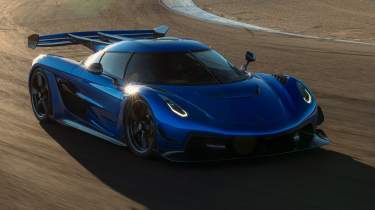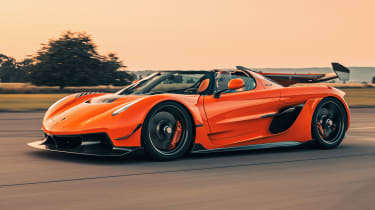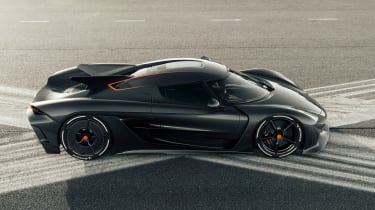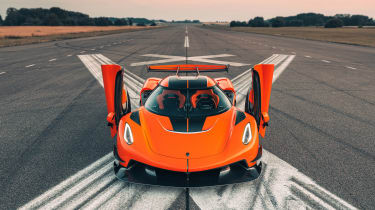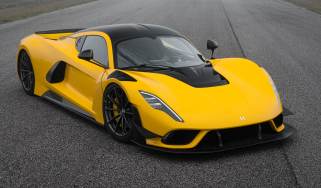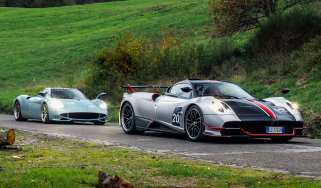Watch the Koenigsegg Jesko's hair-raising Laguna Seca record lap
The Agera successor is aiming for the highest top speed of any production car, but it's also proven its worth on track with a record-breaking lap around Laguna Seca
Following in the footsteps of the record-breaking Agera RS, Koenigsegg launched the Jesko at 2019’s Geneva motor show with a revised carbonfibre tub and power plant, and an all-new gearbox that was developed in-house. As production continues and first customer cars trickle onto the road, the track-orientated Attack variant has now set the production car lap record around Laguna Seca with a Racelogic-verified time of 1:24.86.
Beating the wild Czinger 21C by six tenths of a second, the Jesko's lap time makes it the quickest production car around the 2.2-mile circuit. What makes the feat even more impressive is that neither its driver, Koenigsegg's Markus Lundh, or car had tackled Laguna Seca before the attempt...
While the Jesko Attack is what achieved the lap record, Koenigsegg is also hard at work on development of the low-drag Absolut, a variant with a focus on top speed. The marque is still yet to announce any official figures, but it has previously disclosed a 310mph target, a number that would make the Absolut the world's fastest production car – company founder and CEO Christian von Koenigsegg said: 'The name Absolut comes from the fact that this is the absolute fastest Koenigsegg we will ever make.'
Powering it is a redesigned version of the same 5.0-litre turbocharged V8 found in the marque’s previous models. It pushes up to 1600bhp and 1106lb ft of torque to the rear wheels when running on E85 race fuel – it’s a paltry 1280bhp on standard fuel. Performance figures haven’t been quoted, but we’d imagine it’ll be marginally quicker than the less powerful Agera RS, which has a 0-62mph time of around 2.6sec. The world’s lightest crankshaft (12.8kg), milled from a single solid steel billet, alongside a host of other bespoke, lightweight components can be found throughout the powertrain. The use of lightweight components both reduces unwanted vibration usually found with flat-plane crankshaft power plants and allows the engine to spin at an impressive 8500rpm.
> 2268bhp Koenigsegg Gemera V8 is world’s most powerful production car
One of the highlight features of the Jesko is its new nine-speed Light Speed Transmission (LST). The brand claims it’s capable of ‘near light speed’ gearchanges, due to the simultaneous opening and closing of clutches, allowing for ‘seamless’ acceleration and deceleration. Thanks to the trick multi-clutch system, Ultimate Power On Demand (UPOD) allows the gearbox to jump directly to the most effective gear, unlike a dual-clutch system which has to run through all gears on the way.
Jesko prototype driver Markus Lundh said: ‘Because of its seamless shifting, whether up or down, everything just happens much faster. There are no delays, it is very responsive and behaves exactly the way you want it to.’
As this car is an evolution of the Agera, tweaks have been made to the carbon tub in order to make it a more useable machine. It’s now 40mm longer and 22mm higher to provide occupants with more legroom, headroom and visibility, but still features industry-best torsional rigidity thanks to its carbonfibre and aluminium sandwich construction. The increased focus on practicality doesn’t stop there, either, with rear-wheel steering giving it improved manoeuvrability at low speeds as well as enhanced agility at higher speeds.
Inside, leather, Alcantara, carbonfibre, aluminium and glass can be found throughout, alongside a new ‘SmartWheel’ that sees the integration of two small touchscreens in the steering wheel, allowing the driver to control aspects such as audio, ride height and cruise control. As found on the Regera, miniaturised hydraulics mean almost all hinges on the Jesko are automated.
Alongside all of this, the machine is also capable of over 1000kg of downforce, largely due to its active, top-mounted dual-level rear wing and its front splitter with active underbody aero inlets. Lightweight centre-locking forged aluminium wheels come as standard, with optional centre-locking carbonfibre wheels also available.
The low-drag variant adopts an extended rear end, rear-wheel aero covers, a reduced ride height and removal of the front arch louvres and bonnet vents, contributing towards its incredible 0.278 drag coefficient – for perspective, the Bugatti Chiron claims 0.36Cd in its most efficient mode, with the current top speed production car record-holder, the Agera RS, claiming 0.33.
Alongside the aforementioned tweaks, the Absolut also sees the removal of the Jesko’s large rear wing. In its place are ‘vertical stabilisers’ inspired by the F-15 fighter jet – these both aid in high-speed stability and the reduction of turbulence at the rear, helping to pull its drag coefficient down.
Top speed is yet to be disclosed, but with Koenigsegg claiming it will be the ‘fastest Koenigsegg ever’, a figure in excess of the Agera RS’s 285mph peak speed is a given. Having confirmed a target of 310mph, the Jesko may have a chance of beating Bugatti’s 304mph record, but being a production car, it would be all the more impressive...
The Jesko costs from around £2.3m and will be limited to just 125 units.
